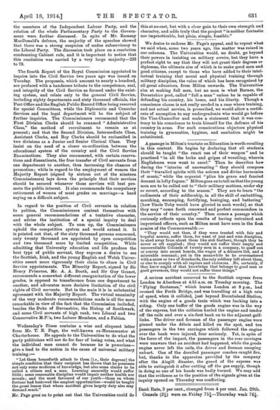A passage in Milton's tractate onEducation is worth recalling in
this context. He begins by declaring that all students should be taught "the exact use of their weapon" and be practised " in all the locks and gripes of wrestling, wherein Englishmen were wont to excel." Then he describes how during the "interim of unsweating " they should compose their "travailed spirits with the solemn and divine harmonies of music," while the organist "plies his grave and fancied descant in lofty fugues." Milton goes on to tell us thatthe young men are to be called out to " their military motions, under sky or covert, according to the season." They are to learn "the rudiments of their soldiership, in all the skill of embattling, marching, encamping, fortifying, besieging, and battering' [how Uncle Toby would have gloried in such words], so that they may "come forth renowned and perfect commanders in the service of their country." Then comes a passage which curiously reflects upon the results of having untrained and improvised officers, such as Milton must have Been in the first armies of the Commonwealth :— "They would not then, if they were trusted with fair and hopeful armies, suffer them, for want of just and wise discipline, to shed away from about them like sick feathers, though they be never so oft supplied ; they would not suffer their empty and unrecruitable Colonels of twenty men in a company, to quaff out or convey into secret hoards, the wages of a delusive list, and a miserable remnant; yet in the meanwhile to be overmastered with a score or two of drunkards, the only soldiery left about them, or else to comply with all rapines and violencea. .No, certainly, if they knew aught of that knowledge that belongs to good men or good governors, they would not suffer these things."










































 Previous page
Previous page